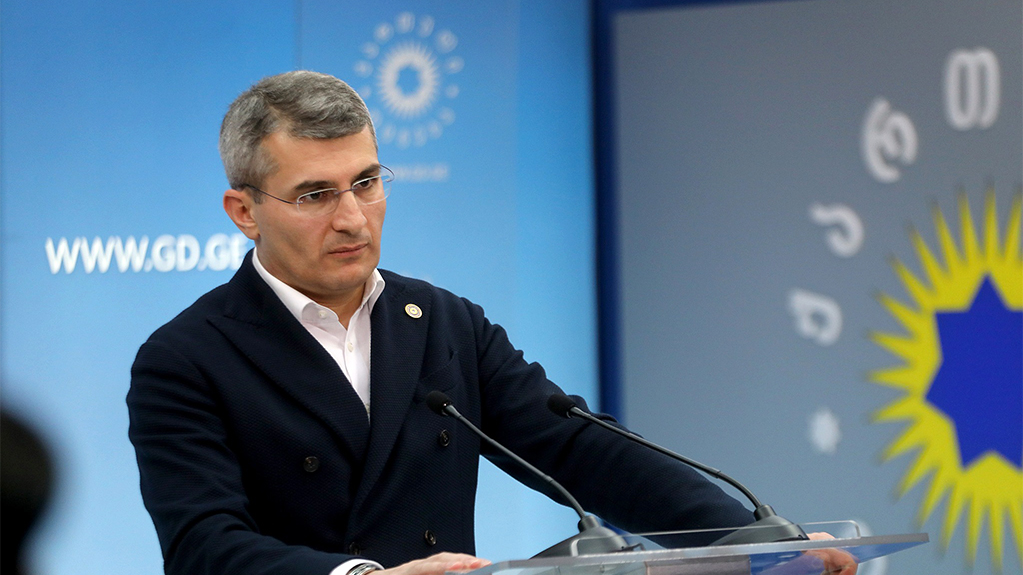Mamuka Mdinaradze, the executive secretary of Georgian Dream party, announced that the ruling party intends to pass the so-called Foreign Agents law in all three readings before the end of the current session. Speaking at a briefing at the party office today, Mdinaradze stated that the parliamentary majority had made this decision yesterday. The text of the law will remain the same, with only the term "agent of foreign influence" being replaced by "organization carrying the interests of a foreign power."
News
"Last year, the radical opposition, “NGOs”, and their lobbyists misled a significant portion of Georgian society, causing them to reject a law that aimed to ensure the accountability and transparency of NGOs. We are the government elected by the Georgian people, and protecting the dignity of Georgian society is our primary responsibility. No one should be excused for deceiving the public. Therefore, after consulting with the political council of the party, the parliamentary majority has decided to resubmit the draft law “On the Transparency of Foreign Influence” to the parliament," Mdinaradze said.
The executive secretary of Georgian Dream reiterated that "the civil sector is the most opaque in Georgia, and in 2020-2022, this is what allowed them to be at the epicenter of the revolutionary scenario, to falsify the results of parallel vote tabulation (PVT) The false conclusions and statements about the "worst elections" they published provided an artificial excuse for the radical opposition to sabotage and refuse to recognize the election results. Based on these claims, the radicals demanded the appointment of extraordinary parliamentary elections, preventing the country from settling for a whole year. Consequently, wealthy NGOs not only played a central role in the revolutionary scenario in 2020-21 but even took on the role of its primary instigator. They found themselves at the center of the revolutionary scenario for the second time in June 2022 when they demanded the government's resignation and the establishment of a so-called technical government, where they would hold key positions themselves, citing Georgia's unjust denial of candidate status. They actively participated in all protests held in 2022, the primary demand of which was to join the sanctions and send volunteers to fight in Ukraine.
For years, so-called non-governmental organizations have been conducting a Soviet-style campaign against the independence of the judiciary. They achieve this by stigmatizing the judiciary and its judges. Although “NGOs” have not yet been able to present court cases that would prove the existence of systemic or even more serious non-systemic problems in the judiciary, they have not given up on their campaign. Even today, they continue to use opaque finances in an attempt to undermine this crucial state institution.
In addition, “NGOs” are actively involved in spreading pseudo-liberal ideology and so-called LGBT propaganda. They participate in campaigns aimed at undermining public trust in the Georgian Orthodox Church, supporting political interventions with religious content in Georgia, and actions against Georgia's energy independence," Mdinaradze said, citing the training programs of Droa, Franklin Club, and Canvas as specific examples of financing extremism.
The Russian law, which required non-governmental and media organizations financially independent from the government to register as "agents of foreign influence" to eliminate independent public organizations in the country, was adopted by Georgian Dream in the first reading on March 7 of last year. On the same day, tens of thousands of people came out in Tbilisi to protest against this decision of the authorities. Demonstrators demanded the repeal of the Russian law. The government dispersed the protest using tear gas, water cannons, and pepper spray. Another rally was held on March 8, which was again dispersed by the government. The Special Forces chased the demonstrators through the streets throughout the night, detaining and beating them. After the brutal crackdown, the protesters smashed vehicles belonging to the Ministry of Internal Affairs and set them on fire. Many rally participants were injured, and one demonstrator lost his sight during the police raid.
As a result of strong protests and unprecedented international pressure, Georgian Dream rejected the Russian law in the second reading during the plenary session held on March 10.















